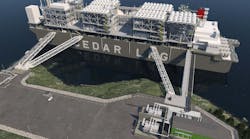The ban on Japanese merchant shipping trading with Saudi Arabian ports is forcing buyers of LPG and refiners to look at ways of circumventing the restrictions.
Hardest hit by the ban is the Japanese LPG business, which supplies about 12 million households and imports about 75% of its requirements. About 40% of these imports comes from Saudi Arabia.
IMPORTERS' RESPONSE
Initial reaction to the ban was to search for more supplies from Pacific Rim countries, but industry sources say it will be impossible to replace the large volumes Japan imported from Saudi Arabia.
Japan's LPG importers have been lobbying-so far unsuccessfully-for a relaxation of restrictions on Japanese flagged tankers visiting Saudi terminals in the Persian Gulf.
This lack of success has forced Japanese oil and gas companies to charter foreign owned tankers not subject to such restrictions. The London shipping newspaper Lloyds List also reported talk in Tokyo of transferring the flag from Japanese vessels to other nations.
One LPG importer, Cosmo Petroleum, asked all its customers to conserve LPG because it must postpone shipments of 90,000 tons of the fuel due to be lifted from Persian Gulf ports.
Another importer, Nippon Petroleum Gas Co., is seeking permission to replace LPG shipments from Ras Tanura and Juaymah with liftings of 200,000 tons of LPG in February from the Red Sea port of Yanbu, which is not subject to Japanese shipping restrictions. The company also expects larger volumes from Nippon Oil Co., which has decided to boost LPG production from its Japanese refineries.
Three companies in the Mitsui group have abandoned Japanese shipping and taken a joint charter on a foreign owned tanker to pick up a 45,000 metric ton LPG cargo from Ras Tanura. Another Japanese importer, Showa Denko, is said to be considering such action. Industry sources say chartering foreign owned tankers will add substantially to transport costs.
Crude oil importers in Japan also are looking for ways around the shipping restrictions, although the threat to supplies in this part of the business is not serious. Shippers are waiting for startup of the expected shuttle service to transport crude oil from Ras Tanura to a transshipment point outside the Persian Gulf. Japanese product buyers want a similar shuttle from Persian Gulf refineries but have been told by the Saudis there are no plans for a service like that.
Japanese tankers are free to load from the Yanbu terminal on the Red Sea, which is running flat out with the east-west pipeline from the Eastern Province pumping at maximum 3.2 million b/d capacity, compared with only 1.5 million b/d in early January.
Japanese oil companies have been pressuring shipping companies and the seamens union for a revised exclusion zone based on the latest military information from the Persian Gulf.
MORE PROBLEMS
The Petroleum Association of Japan told the union the restriction on Japanese flagged vessels might jeopardize Japan's long term relationship with Saudi Arabia.
Restrictions on Japanese shipping visiting Saudi Arabia also have created problems for Samarec, the Saudi Arabian refining and marketing organization. Japan is its largest single customer for LPG, and the loss of this market has led to full storage tanks, reinjection of some gas liquids, and some flaring.
Copyright 1991 Oil & Gas Journal. All Rights Reserved.

